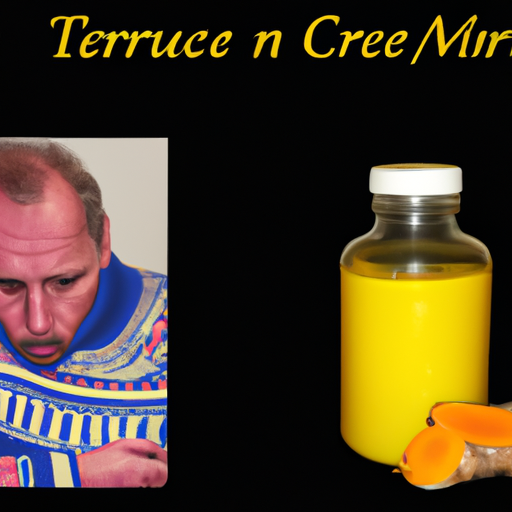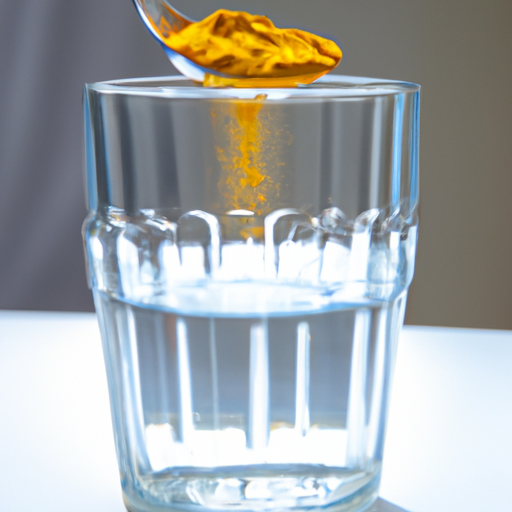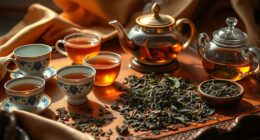Chamomile tea, the calming concoction cherished by many, is renowned for its soothing properties. But did you know that there are certain substances you should avoid mixing with this delightful brew? In this article, I will divulge the key culprits that should be kept at bay when sipping on chamomile tea.
First and foremost, medications with sedative effects should not be paired with this aromatic elixir. Combining chamomile tea with such medications can intensify drowsiness and lethargy, potentially leading to adverse effects.
Additionally, alcohol and caffeine should be avoided when enjoying a cup of chamomile tea, as they may counteract its calming benefits.
Furthermore, individuals taking anticoagulant medications or certain medications for blood pressure or heart conditions should exercise caution when consuming chamomile tea. This golden elixir may interact with these medications, altering their effectiveness.
Lastly, individuals with dairy allergies or sensitivities should refrain from adding milk or cream to their chamomile tea. This can prevent any unwanted allergic reactions or discomfort.
By being aware of these substances to avoid, you can fully reap the relaxing benefits of chamomile tea. So sit back, sip away, and let chamomile tea work its tranquil magic.
Key Takeaways
- Chamomile tea should not be mixed with medications that have sedative effects.
- Alcohol and caffeine should be avoided when consuming chamomile tea.
- Individuals taking anticoagulant medications or certain medications for blood pressure or heart conditions should exercise caution when consuming chamomile tea.
- Individuals with dairy allergies or sensitivities should refrain from adding milk or cream to their chamomile tea.
Medications that have sedative effects
You shouldn’t drink chamomile tea with certain medications that make you sleepy, like antihistamines or sleeping pills. Chamomile tea has mild sedative properties itself, so combining it with medications that also have sedative effects can increase drowsiness and potentially lead to excessive sleepiness or impaired coordination.
If you’re looking for herbal remedies for insomnia or natural alternatives to sedative medications, chamomile tea can be a suitable option. It contains compounds that promote relaxation and may help improve sleep quality. However, it’s important to consult with your healthcare provider before using chamomile tea as a sleep aid, especially if you’re currently taking sedative medications.
Speaking of potential interactions, another substance you should be cautious about when consuming chamomile tea is alcohol.
Alcohol
Indulging in a spirited beverage while sipping on chamomile tea is a delicate dance best left unexplored. When alcohol and chamomile tea are combined, it can potentially lead to an increased sedative effect. This is because both alcohol and chamomile tea have calming properties that can cause drowsiness and impair cognitive function.
The combination may result in excessive drowsiness, difficulty concentrating, and impaired coordination. Additionally, both alcohol and chamomile tea can cause stomach irritation, and combining them may exacerbate these effects. It’s important to note that the potential risks and interactions may vary depending on the individual’s sensitivity and the amount consumed.
To ensure your safety and well-being, it’s best to avoid consuming alcohol while enjoying chamomile tea. Transitioning to the subsequent section about caffeine, it’s important to consider the potential interactions between chamomile tea and other beverages.
Caffeine
Combining caffeine with chamomile tea can create an invigorating blend that awakens the senses. While chamomile tea is typically known for its calming properties, adding a little bit of caffeine can provide an extra boost of energy.
However, it’s important to note that chamomile tea does contain some caffeine naturally, although in much smaller amounts compared to traditional caffeinated beverages. If you’re looking for herbal alternatives to traditional caffeine sources, chamomile tea can be a great option.
Not only does it offer a soothing and relaxing effect, but it also provides various health benefits, such as reducing inflammation, improving sleep quality, and boosting the immune system.
Now, let’s transition to the next section about anticoagulant medications.
Anticoagulant medications
Anticoagulant medications can be a crucial component in preventing blood clotting and reducing the risk of stroke or heart attack. When considering herbal remedies or natural supplements like chamomile tea, it’s important to be aware of any potential interactions with these medications.
Chamomile tea contains certain compounds that may have anticoagulant properties, which could enhance the effects of these medications and increase the risk of bleeding. It’s recommended to consult with a healthcare professional before consuming chamomile tea or any other herbal remedies while taking anticoagulant medications. This precaution ensures that potential interactions are properly assessed and managed.
Moving forward, it’s also important to consider allergens or substances that trigger allergies, as they can have similar interactions with medications and impact one’s health.
Allergens or substances that trigger allergies
Be cautious and mindful of allergens or substances that can trigger your allergies, as they have the potential to interact with medications and impact your health.
When it comes to chamomile tea, there are certain allergens or substances that you should be aware of. Chamomile belongs to the same family as ragweed, so if you have a known allergy to ragweed, chamomile tea may cause cross-reactivity and trigger allergic symptoms. Additionally, chamomile tea may cause allergic reactions in individuals who are allergic to plants in the daisy family, such as chrysanthemums, marigolds, or daisies. It is important to recognize potential side effects of chamomile tea and avoid consuming it if you have known allergies to these plants.
Transitioning into the subsequent section about certain medications for blood pressure or heart conditions, it’s crucial to consider possible interactions with chamomile tea.
Certain medications for blood pressure or heart conditions
Watch out for certain medications for blood pressure or heart conditions—they can be a ticking time bomb when mixed with chamomile tea.
Chamomile tea is known for its calming properties and is often used as a natural remedy for various ailments. However, it is important to be aware of potential interactions with herbal supplements, especially when taking medications that affect blood pressure or heart function.
Chamomile tea contains compounds that can have a mild blood-thinning effect. When combined with medications such as beta-blockers or ACE inhibitors, which are commonly used to treat high blood pressure or heart conditions, this can increase the risk of bleeding or lower blood pressure too much. This can lead to dizziness, lightheadedness, or even fainting.
It is always recommended to consult with a healthcare professional before adding chamomile tea or any herbal supplement to your routine, especially if you are taking medications for blood pressure or heart conditions. They can provide personalized advice and help you avoid any potential side effects of chamomile tea.
Moving on to the next topic, let’s discuss the compatibility of chamomile tea with dairy products.
Dairy products
Mixing chamomile tea with dairy products can create a soothing and creamy beverage option. It’s a great way to enjoy the calming effects of chamomile while also adding a touch of richness to your drink.
Here are some vegan alternatives to dairy products that you can use:
-
Almond milk: Made from ground almonds, this plant-based milk is a popular choice for those looking for a dairy-free alternative. It has a slightly nutty flavor that complements chamomile tea well.
-
Coconut milk: Known for its creamy texture and tropical taste, coconut milk adds a delicious twist to chamomile tea. It’s also a good source of healthy fats.
-
Oat milk: Made from soaked oats, oat milk has a mild and slightly sweet taste. It’s a great option for those with nut allergies.
-
Soy milk: Made from soybeans, soy milk is a versatile dairy alternative that works well in chamomile tea.
In addition to being dairy-free, chamomile tea also offers potential health benefits. It has been shown to have anti-inflammatory and antioxidant properties, which may help reduce inflammation and boost immune function.
So go ahead, try mixing chamomile tea with these vegan alternatives for a creamy and healthful beverage.
Frequently Asked Questions
Can I drink chamomile tea with over-the-counter sleep aids?
Can I drink chamomile tea with over-the-counter sleep aids? Mixing chamomile tea with over-the-counter sleep aids can potentially have interactions with melatonin and may have effects on pregnancy. It’s important to consult a healthcare professional for personalized advice.
Is it safe to consume chamomile tea while taking antidepressant medications?
It is generally safe to consume chamomile tea while taking antidepressant medications, but it is important to be aware of potential side effects. Chamomile tea may have potential benefits for mental health.
What are the potential risks of drinking chamomile tea with antihistamines?
Combining chamomile tea with antihistamines can be a risky game of tug-of-war. The potential risks include interactions with blood thinners like warfarin, which can lead to increased bleeding. Stay cautious, my friend.
Can chamomile tea interact with blood thinners like warfarin?
Yes, chamomile tea can potentially interact with blood thinners like warfarin, aspirin, or clopidogrel. It may increase the risk of bleeding. Additionally, chamomile tea may affect the effectiveness of hormonal birth control.
Are there any known interactions between chamomile tea and herbal supplements commonly used for heart health?
Interactions between chamomile tea and herbal supplements commonly used for heart health are not well-studied. However, chamomile tea may interact with blood pressure medication and could potentially affect cholesterol levels.
Conclusion
In conclusion, it’s important to be cautious when consuming chamomile tea and avoid certain substances that may interact with it. Medications with sedative effects, alcohol, and caffeine should be avoided when drinking chamomile tea because they can enhance its sedative properties.
Additionally, anticoagulant medications and certain medications for blood pressure or heart conditions may interact with chamomile tea and should be avoided.
Lastly, it’s advisable to refrain from consuming chamomile tea with dairy products as they can interfere with its absorption.
Remember, just like oil and water don’t mix, certain substances and chamomile tea don’t mix well either.










